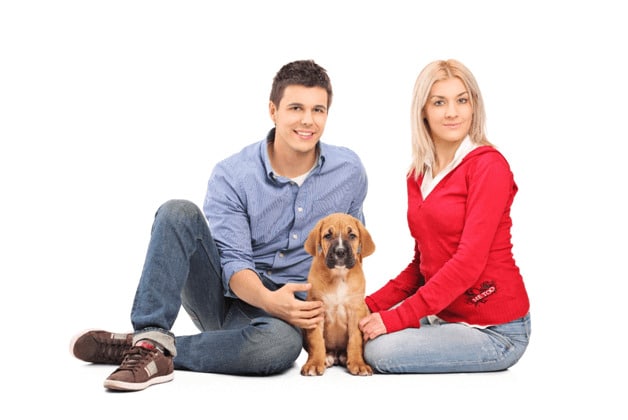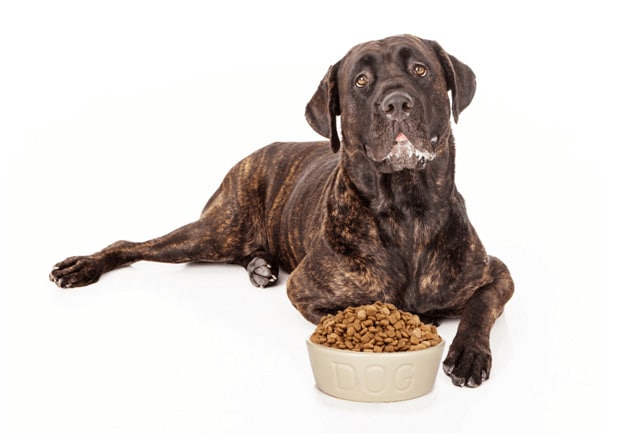Are you the proud owner of a Cane Corso puppy? Have you been wondering when your furry friend will stop growing? Well, you’re not alone! Many new dog owners often wonder when their pooch will reach its full potential. In this article, we’ll be diving into the topic of when does a Cane Corso stop growing.
The Cane Corso will stop growing at around two years of age. However, there are many factors that can affect this breed’s growth, including genetics, nutrition, and exercise.
Now that you know when a Cane Corso stops growing, let’s dive deeper into the topic. We consulted with veterinarian experts and experienced Cane Corso breeders to provide you with accurate information and practical advice.
So, sit back, relax, and let’s explore the exciting world of Cane Corso’s growth together!
How Big Should a Cane Corso Puppy Be?
A Cane Corso puppy should weigh around 25 to 35 pounds with a height of 21 -24 inches. This may vary depending on the litter and the individual dog. As a general rule, most puppies will reach their full size by the age of two. Again, this depends on the individual dog’s genetics and environment.
Size of Cane Corso from Birth to 2 Weeks
The Cane Corso is a big breed, so they will be about the size of a Labradoodle from birth to two weeks. They will weigh between six and eight pounds at this point.
Size of Cane Corso from 3-12 Weeks

At three to twelve weeks, the Cane Corso will start to fill out and will weigh around 12-20 pounds. They will be about the size of a Beagle at this point.
Size of Cane Corso at 4-6 Months
At four to six months, the Cane Corso will be close to their adult size. They will weigh between 30 and 50 pounds at this point. They will be about the size of a Golden Retriever at this point.
Size of Cane Corso from 7-9 Months
At seven to nine months, the Cane Corso will weigh between 60 and 70 pounds. They will be about the size of a small Rottweiler at this point.
Size of Cane Corso at 10-12 Months
At ten to twelve months, the Cane Corso will be almost fully grown. They will weigh between 80 and 100 pounds at this point. They will be about the size of a typical Great Dane.
Growth Chart & Milestones
The following chart provides a guide for owners of the Cane Corso to understand their development stages and milestones to expect.
| Age | Weight | Height | Milestones |
| 2 months | 10-20 lbs | 12-16 inches | Eyes and ears open puppy teeth emerge, starts to stand and walk |
| 3 months | 20-30 lbs | 14-18 inches | Socialization period, teething, start of house training |
| 4 months | 30-40 lbs | 16-20 inches | Permanent teeth come in, obedience training can begin |
| 5 months | 40-50 lbs | 18-22 inches | Adolescence starts, rapid growth spurt, increased exercise and socialization needed |
| 6 months | 50-60 lbs | 20-24 inches | More advanced training can begin, start to settle into adult personality |
| 9 months | 70-80 lbs | 22-26 inches | Teething ends, sexual maturity starts, may show increased independence and stubbornness |
| 12 months | 90-100 lbs | 24-28 inches | Growth slows down, adult coat and color start to come in |
| 18 – 24 months | 100-120 lbs | 24-28 inches | Cane Corso typically reaches adult size and weight |
Full-Grown Cane Corso Dog Size
Cane Corsos can vary in size and weight depending on factors such as genetics, nutrition, and exercise.
However, on average, Cane Corsos can reach a height of 24-28 inches (60-70 cm) and a weight of 100-120 pounds (45-54 kg) as adults.
It’s important to note that individual dogs may be smaller or larger than this range, so it’s best to monitor your Cane Corso’s growth and development using the growth chart and milestones provided and consult with a veterinarian if you have any concerns about their size or weight.
What Health Issues Affect the Growth of a Cane Corso?
Cane Corsos are generally a healthy breed, but like all breeds, they may be prone to certain health issues that can affect their growth and development.
Some of the health issues that can affect the growth of a Cane Corso include:
Hip Dysplasia
This is a genetic condition that affects the hip joints, causing pain and difficulty in movement. It can lead to arthritis and may affect the growth and development of a Cane Corso.
Elbow Dysplasia
Similar to hip dysplasia, elbow dysplasia is a genetic condition that affects the elbow joint. It can cause pain and lameness and may also affect the growth and development of a Cane Corso.
Bloat
Also known as gastric torsion or twisted stomach, bloat is a life-threatening condition that can affect deep-chested breeds like the Cane Corso. It occurs when the stomach fills with gas and twists on itself, cutting off the blood supply to the stomach and other organs.
Hypothyroidism
This is a condition that affects the thyroid gland and can lead to weight gain, lethargy, and slow growth in Cane Corsos.
Dilated cardiomyopathy
This is a heart condition that can affect Cane Corsos, causing the heart to enlarge and weaken. It can lead to heart failure and may affect the growth and development of a Cane Corso.
It’s important to work with a reputable breeder who conducts health screenings on their breeding dogs and to schedule regular check-ups with a veterinarian to catch and address any health issues early on.
A healthy diet, regular exercise, and proper care can also help promote the growth and development of a Cane Corso.
How Do I Make Sure My Cane Corso Is Healthy?
Just like with any other pet dog, it is important to take your Cane Corso to the veterinarian for regular check-ups.
They should have a physical every year and a blood test every two years. Cane Corsi are prone to hip dysplasia and bloat, so it is important to be aware of the symptoms and seek veterinary attention if your dog is showing any signs of these conditions.
It is also important to brush your Cane Corso’s teeth regularly and give them bone marrow or chew toys to help keep their teeth healthy.
What If My Cane Corso Is Not the Right Weight?
If your Cane Corso is not the right weight, it is important to consult with your veterinarian. The experts can help you determine if your dog is underweight or overweight and make recommendations to return them to a healthy weight.
Cane Corsi are large dogs that require a lot of food, water, and exercise. They are not the right breed for everyone, so it is important to do your research before getting one.
Does Spaying or Neutering My Cane Corso Cause Stunting?
Spaying or neutering a Cane Corso is a common practice for many dog owners, but the timing of the procedure can have a significant impact on their growth and development.
While spaying or neutering can prevent certain health issues and unwanted behaviors, it’s important to consider the optimal timing to avoid any potential negative effects on their growth.
The recommended age for spaying or neutering a Cane Corso is typically between six and twelve months.
However, recent research suggests that delaying the procedure until the dog has reached full maturity may be beneficial.
This is because spaying or neutering before a dog has fully matured can impact their hormone levels, which play a critical role in their growth and development.
Specifically, spaying or neutering too early can result in the dog having longer limbs and a narrower frame. This can also lead to an increased risk of joint issues, such as hip dysplasia, as the bones may not have fully developed to support the dog’s weight.
Delaying the procedure until the dog has reached full maturity can allow for proper bone and muscle development, leading to a healthier and more proportionate physique.
In addition to growth concerns, there are also other potential health risks associated with early spaying or neutering. These include an increased risk of certain types of cancer and behavioral issues such as anxiety and aggression.
Overall, it’s important for Cane Corso owners to consider the optimal timing for spaying or neutering to ensure the best possible outcomes for their dog’s growth and development.
Consulting with a veterinarian can help determine the best age to proceed with the procedure while minimizing any potential negative impacts.
Does Poor Nutrition with My Cane Corso Cause Stunting?

There is no evidence that poor nutrition with your Cane Corso will cause stunting. Ask your vet about what kind of food and how much food your dog needs based on their age, weight, and activity level.
Puppies should normally be fed three to four times a day. Adult dogs should be fed twice a day. While there is no strong proof to suggest that poor nutrition causes a Cane Corso to stop growing, it is still important to ensure they are receiving a balanced diet.
A healthy diet for your Cane Corso will help them avoid obesity and joint problems, among other health issues.
Poor nutrition can lead to numerous health problems in dogs, however, including obesity and joint problems. Ensure that your dog receives a balanced diet that meets its nutritional needs.
Speak to your veterinarian if you have any questions about your dog’s diet. You should maintain a close watch on your dog’s weight and monitor their diet if its weight starts to fluctuate.
Does A Cane Corso’s Weight Affect Its Life Expectancy?
Yes, a Cane Corso’s weight can affect its life expectancy. Overweight Cane Corso dogs are more likely to suffer from health problems such as arthritis, diabetes, and heart disease.
Underweight dogs may have a weakened immune system and be more susceptible to infections. It is important to consult with your veterinarian about what is the ideal weight for your individual dog based on their age, breed, and lifestyle.
Final thoughts
The Cane Corso is a large, strong dog that will typically stop growing at around 2 years of age.
They may not be the right breed for everyone, so it is important to do your homework before you purchase one. If you are unable to provide the proper care for a Cane Corso, it is important to find a home that can.

